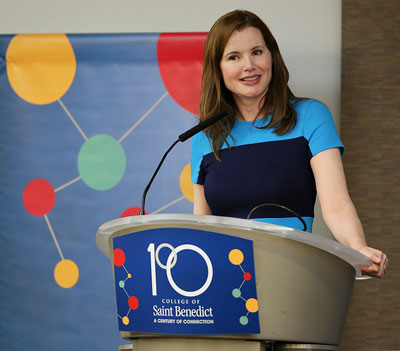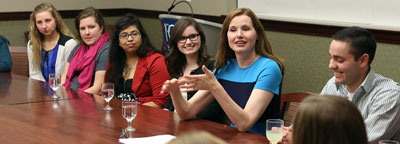Actor brings gender equality fight to CSB
Geena Davis wants to see more women on screen
February 26, 2014
By Mike Killeen


Like a lot of students, Geena Davis took up a job when going to school at Boston University to study acting.
"I considered myself a waiter who wanted to become an actor," Davis told a crowd of about 600 people Tuesday, Feb. 26, at Gorecki Dining and Conference Center, CSB.
That tidbit, early in her 2014 Renaissance Series Lecture, helped set the stage for her comments on "Gender Equality in the Media." She wasn't a waitress or an actress; she was a waiter and an actor.
Using a mix of spot-on humor and statistics, Davis talked to the crowd about inequalities in media — mostly confined to movies and television, but also mentioning sports reporting and governmental representation.
"There are far fewer great parts for women in the media — they are the girlfriends of a character doing interesting things, or a mother. They are not vital parts of the movie," Davis said.
She quoted a University of Denver study that looked at 10 sectors of society. The study found that only 22 percent of television broadcasters were women; 19 percent of print journalists were women; and that 17 percent were tenured professors or female military leaders. It also found that crowd scenes in movies contained 17 percent women.
"My body fat is 17 percent," Davis said, smiling. "Why would that number stall out in all sectors?"
Research confirms what Davis saw
To help answer that question, she formed the Geena Davis Institute on Gender in Media. While watching children's videos with her daughter, she noticed the lack of women's characters in the videos. She commissioned the largest research project on gender in film and television, conducted by Stacy Smith at the University of Southern California's Annenberg School for Communication and Journalism.
The research confirmed the disparity she observed — in family films, there was only one female character for every three male characters. The repetitive viewing patterns of children ensured that these negative stereotypes were ingrained and imprinted over and over.
Worse, some of the animated characters wore the same amount of clothing (or lack thereof) as "an R-rated movie," Davis said. "Some of the characters have waists so tiny, could a spine even possibly fit in there?"
Davis said she has approached media leaders, who generally are supportive of her battle. "I try to do it in a very positive way," Davis said. "They've told me that they really do want to do better — 95 percent told me that gender equality is very important to them."
But movies take so long to make — up to 10 years for an animated feature — it's hard to change the reality right away, Davis said.
"I'd like to contact all the movie reviewers in the nation and make them announce that there's only one female character in this movie," Davis said.
Her other bit of advice?
"Pay attention, and share that with other people. Write them a letter, and send those things that you send out," Davis said jokingly of social media.
"We can have equality, as long as we can be seen or hear us," Davis added, a statement that drew the largest response of the night.
Student reaction positive to speech
"I was thrilled that there was so much humor involved (in her speech)," said CSB sophomore Sarah Kelleher, an elementary education major from Circle Pines, Minn., who was part of a special meet-and-greet with Davis after her speech. "I knew that since the speech was here (at CSB), the audience was going to be mostly female, but there were going to be males in the audience. It's easier to talk about the subject to females than males, but I thought her speech was hilarious, and I thought she was so well-spoken and relatable. I enjoyed myself, and I learned a lot.
"I love my celebrities, and I would have come here no matter. But this is a topic I'm passionate about," Kelleher said.
Erin Noel, a CSB senior majoring in communication from Eagan, Minn., had seen the documentary, "Miss Representation," in a class. The film, written and directed by Jennifer Siebel Newsom, exposes how mainstream media contribute to the under-representation of women in positions of power and influence in America.
"I wasn't aware how her (Davis') work had affected the media industry," Noel said. "Her status in the media industry, I think, really bulked up her presentation and made it more presentable, more believable. The fact that she believes so strongly in it is also very inspiring."
Serving CSB and SJU, the Renaissance Series was established by CSB President MaryAnn Baenninger in 2006 to bring speakers to CSB who "demonstrate the diversity of opportunities available for women and men ... to encourage them to broaden their horizons in every aspect, particularly in areas that are less traditional for the respective genders."
